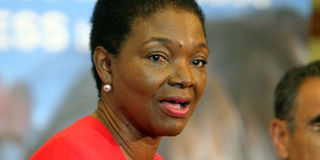Aid chief visits South Sudan amid fighting

Valerie Amos, UN's Under-Secretary-General for Humanitarian Affairs and Emergency Relief Coordinator, speaking during a conference.
What you need to know:
- UN aid chief Valerie Amos arrived in war-torn South Sudan on Mondy amid a growing humanitarian crisis, with rebels and government accusing each other of breaking a ceasefire aimed at ending the conflict.
- Ms Amos, UN Under-Secretary-General for Humanitarian Affairs, will also stress the “importance of ensuring the protection of civilians, and of aid workers”, a statement added.
JUBA, Monday
UN aid chief Valerie Amos arrived in war-torn South Sudan on Monday amid a growing humanitarian crisis, with rebels and government accusing each other of breaking a ceasefire aimed at ending the conflict.
Ms Amos, who arrived in Juba at the start of a three-day visit, is due to meet with government officials and aid workers in a bid to boost relief to the troubled young nation, where thousands have been killed and over 700,000 people have fled their homes in over six weeks of bloodshed.
The fighting has seen waves of brutal revenge attacks, as fighters and ethnic militia use the violence to loot and settle old scores, with the United Nations and rights workers reporting that horrific atrocities have been committed by both sides.
Ms Amos, UN Under-Secretary-General for Humanitarian Affairs, will also stress the “importance of ensuring the protection of civilians, and of aid workers”, a statement added.
Both sides say the other is breaking a ceasefire which began Friday evening, but insisting they are committed and that they have opened fire only in self-defence.
Army spokesman Philip Aguer accused the rebels today of “multiple violations” of the ceasefire.
ATTACKS ON SUNDAY
“There were large scale attacks on our positions on Sunday,” Aguer told AFP, reporting fighting in the northern oil-producing state of Upper Nile, as well as in the troubled eastern state of Jonglei.
“They killed four soldiers in Mathiang in Jonglei, but because they were attacking our defensive positions, we repulsed them and killed around 120 of their forces,” Aguer added. It was not possible to verify the claim independently.
Rebel military spokesman Lul Ruai Koang also reported Sunday “clear violations” of the ceasefire.
Norwegian Foreign Minister Borge Brende, speaking Sunday in Sudan, said the ceasefire was “very shaky”.
Norway forms the “troika” of nations along with Britain and the United States, who have played a key role supporting the young nation.
Eighteen unarmed monitors from the seven-member East African regional bloc IGAD — which brokered the ceasefire in Ethiopia — are to oversee implementation of the ceasefire agreement.
Up to 10,000 people are believed to have been killed in the fighting pitting forces loyal to President Salva Kiir against a loose coalition of army defectors and ethnic militia nominally headed by sacked vice president Riek Machar, a seasoned guerrilla fighter. (AFP)
Many fear the conflict has slid out of the control of political leaders, with ethnic violence and revenge attacks between the Dinka people of Kiir and the Nuer of Machar, the country’s two largest groups.
DEEP ALARM
A statement this weekend from 55 international and South Sudanese aid agencies, including organisations such as Oxfam, Save the Children and the International Rescue Committee, said they remained “deeply alarmed at the scale of human suffering” in the country.
At least 30 children died in a measles outbreak in a crowded camp of over 10,000 people squeezed into the UN peacekeeping base in the devastated town of Bor — which swapped hands four times in the fighting — the UN children’s agency (Unicef) has said.
“The camp in Bor is as bad as anything I have seen anywhere,” said Unicef spokeswoman Sarah Crowe on Monday, after returning from a mission to deliver vaccines over the weekend to some 4,000 children.
“People are living under scraps of plastic in the worst of conditions,” Crowe added, with more than 76,000 people are crowded inside UN peacekeeper bases across the country.
“They are too scared to leave, and even for a funeral, they just leave the camp for as short as time as possible to bury the body before coming back,” Crowe said.





